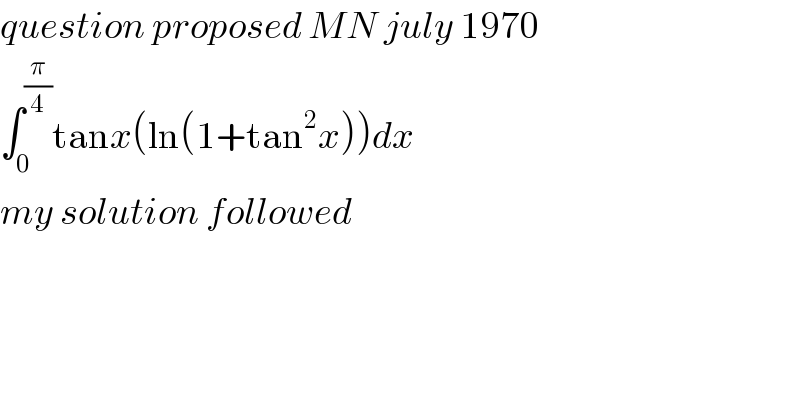
Question and Answers Forum
Question Number 111157 by mathdave last updated on 02/Sep/20

Answered by mathdave last updated on 02/Sep/20
![since 1+tan^2 x=sec^2 x let I=∫_0 ^(π/4) tanxln(sec^2 x)dx=2∫_0 ^(π/2) tanxln(secx)dx let u=ln(secx),du=tanxdx and dx=(1/(tanx))du I=2∫_0 ^(π/4) tanx×u×(1/(tanx))du=2∫_0 ^(π/4) udu I=2[(u^2 /2)]_0 ^(π/4) =2[((ln^2 (cosx))/2)]_0 ^(π/4) =[0−ln^2 ((1/(√2)))]=(1/4)ln^2 (2) ∵∫_0 ^(π/4) tanx(ln(1+tan^2 x))dx=(1/4)ln^2 (2) mathdave(02/09/2020)](Q111161.png)
Commented by mnjuly1970 last updated on 02/Sep/20

Commented by mathdave last updated on 02/Sep/20

Answered by mathmax by abdo last updated on 02/Sep/20
![I =∫_0 ^(π/4) tanx(ln(1+tan^2 x))dx changement tanx =t give I =∫_0 ^1 tln(1+t^2 )(dt/(1+t^2 )) =_(by parts) [(1/2)ln(1+t^2 )ln(1+t^2 )]_0 ^1 −∫_0 ^1 (1/2)ln(1+t^2 )((2t)/(1+t^2 )) dt =(1/2)ln^2 (2)−∫_0 ^1 ((tln(1+t^2 ))/(1+t^2 ))dt =(1/2)ln^2 (2)−I ⇒2I =(1/2)ln^2 (2) ⇒★ I =(1/4)ln^2 (2)★](Q111257.png)
Commented by mnjuly1970 last updated on 03/Sep/20

